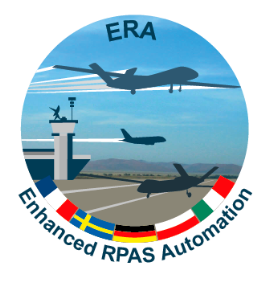The European Defence Agency (EDA) and an industrial consortium led by Airbus Defence and Space have launched today a new project to contribute to the integration of Remotely Piloted Aircraft Systems (RPAS) into common airspace in Europe.
New standards for RPAS
A contract for the Enhanced RPAS Automation (ERA) project was signed between the EDA and a multinational industrial consortium in mid-December 2015. The project will support the widespread use of both civil and military RPAS in non-segregated airspace in Europe in general and their integration in airport operations in particular, addressing several capability gaps identified in the European RPAS Steering Group (ERSG) Roadmap for RPAS air traffic insertion. The project will contribute to setting the European standards that will provide the technical grounds for the certification of the Automatic Take-off and Landing, Autotaxi and Automation and Emergency Recovery functionalities, in the frame of the regulatory framework currently being produced.
To achieve these goals, technical and procedural solutions will be developed, and demonstrated by simulations and flight trials. Additionally, the project includes the development of draft standards in cooperation with the European Organisation for Civil Aviation Equipment (EUROCAE). The project also relies on active collaboration with other important stakeholders, such as the European Aviation Safety Agency (EASA) and Eurocontrol.
Roland Van Reybroeck, EDA Director Cooperation Planning & Support explains: ”ERA complements the air traffic integration efforts of other related EDA projects, such as MIDCAS (MID-air Collision Avoidance System) covering en-route Detect & Avoid and DESIRE (Demonstration of Satellites enabling the Insertion of RPAS in Europe) covering satellite command and control data links. These projects, strongly driven by military requirements, have achieved tangible results but there is a need to proceed with further investments, also in view of establishing dual-use standards and meeting civil regulation requirements.”
ERA as ad-hoc EDA project
ERA is an EDA ad-hoc project launched by five Member States: France, Italy, Poland, Sweden and Germany as the lead nation. The planned duration of the project is 42 months with an overall budget of around €31 million (excl. VAT).
 The ERA industrial consortium is led by Airbus Defence and Space, and composed of sixteen partners from five EDA Member States: Airbus Defence and Space and ESG Elektroniksystem- und Logistik-GmbH from Germany; Sagem, Thales and ONERA from France; Saab from Sweden; Finmeccanica from Italy; and nine partners from Poland: Air Force Institute of Technology (leadership Polish consortium), Institute of Aviation, Hertz Systems Ltd., EUROTECH, PIAP (Przemysłowy Instytut Automatyki i Pomiarów), Eskadra Grzegorz Trzeciak, Politechnika Rzeszowska (Rzeszow University of Technology - RUT), WB Electronics S.A., Asseco Poland S.A.
The ERA industrial consortium is led by Airbus Defence and Space, and composed of sixteen partners from five EDA Member States: Airbus Defence and Space and ESG Elektroniksystem- und Logistik-GmbH from Germany; Sagem, Thales and ONERA from France; Saab from Sweden; Finmeccanica from Italy; and nine partners from Poland: Air Force Institute of Technology (leadership Polish consortium), Institute of Aviation, Hertz Systems Ltd., EUROTECH, PIAP (Przemysłowy Instytut Automatyki i Pomiarów), Eskadra Grzegorz Trzeciak, Politechnika Rzeszowska (Rzeszow University of Technology - RUT), WB Electronics S.A., Asseco Poland S.A.
Background
RPAS have demonstrated their importance in recent military operations, particularly for surveillance and information gathering. However RPAS can also offer a wide range of civil applications such as infrastructure surveillance, firefighting, disaster or environmental monitoring, as well as border control and management. RPAS have been earmarked as one of four capability development priorities by the December 2013 European Council.
The European Defence Agency has divided its work in the field of RPAS into five main areas: (1) Integration of military RPAS in non-segregated civilian airspace; (2) Certification of future military RPAS; (3) Development of cutting-edge technologies for future European RPAS; (4) Establishment of a community of military RPAS users in Europe; (5) Support to the development of a European medium-altitude long endurance (Male) RPAS to be operational by 2025.
More information: